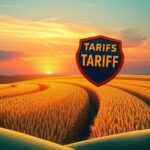The Financial Impact of U.S. Tariffs on Chinese Auto Part Suppliers
Chinese auto part suppliers predict that Americans will ultimately bear the costs of tariffs imposed by the U.S. government. Judy Zhang and Gosven Zuo, representatives from the industry, share insights into how the current tariffs affect pricing and production strategies. Despite claims of inducing domestic manufacturing, both suppliers argue that relocating production to the U.S. is neither practical nor economically feasible.
The U.S. tariff of 25% on automobile imports, effective soon, significantly impacts Chinese auto part suppliers, such as Judy Zhang’s company in Qingdao, which produces brake hoses. Zhang highlights that despite President Trump’s claims that foreign countries will bear the cost of these tariffs, it will largely be American consumers who absorb the financial burden. The initial 25% tariff from Trump’s first term, combined with additional tariffs, has already made the industry feel the strain.
Zhang has been able to transfer a considerable portion of the existing 45% tariffs onto U.S. customers, indicating that limited manufacturers can replicate her company’s broad production capabilities. While she is open to absorbing up to 15% of any new tariffs if U.S. clients increase their orders, this approach may lead to raised prices for American consumers. Chinese auto parts remain integral to the U.S. aftermarket, with retailers depending on their cost-effective production for a diverse inventory.
Industry experts emphasize that for major car manufacturers, such as Ford and Toyota, parts availability is crucial. Jack Perkowski highlighted the efficiency of Chinese manufacturers in cost management and production flexibility, which are difficult for other nations to replicate. Other suppliers, like Gosven Zuo, who produces engine mounts, noted that U.S. buyers have primarily borne the costs of existing tariffs. However, with rising tariffs, suppliers find themselves with dwindling capacity to absorb additional expenses.
Zuo, who has a limited share of his market in the U.S., is adapting by seeking to expand into Europe and the Middle East, showcasing the need for diversification to remain viable amid tariff pressures. Both Zuo and Zhang express skepticism regarding the feasibility of relocating manufacturing to the U.S., citing high establishment costs and uncertainty regarding future trade policies. The sentiments reflect a broader apprehension within the industry of adapting to ongoing tariff implications, which do not appear conducive for returning manufacturing back to the American shores.
In conclusion, the imposition of tariffs on Chinese auto parts is expected to primarily impact American consumers, contradicting claims that foreign nations will absorb the costs. Suppliers like Judy Zhang and Gosven Zuo emphasize the challenges of increasing tariffs while maintaining competitiveness. The belief among industry professionals that shifting manufacturing back to the U.S. is unrealistic underlines the complex dynamics of global trade and production in the auto parts industry. The future remains uncertain as firms navigate these financial impediments.
Original Source: www.nbcnews.com








Post Comment